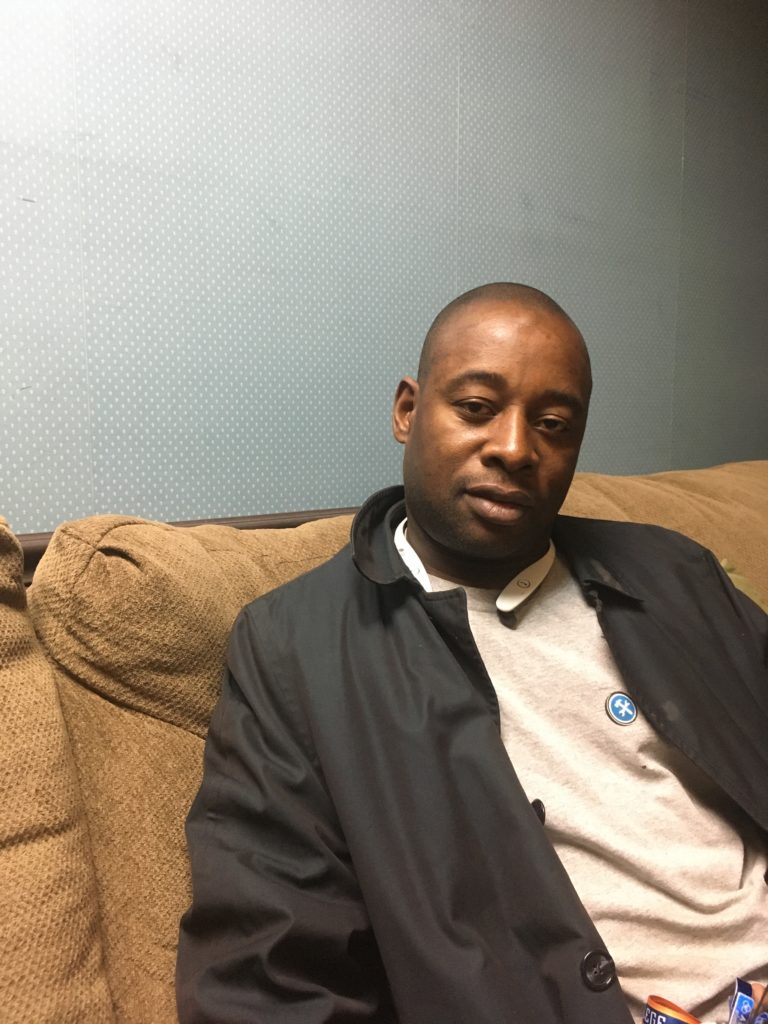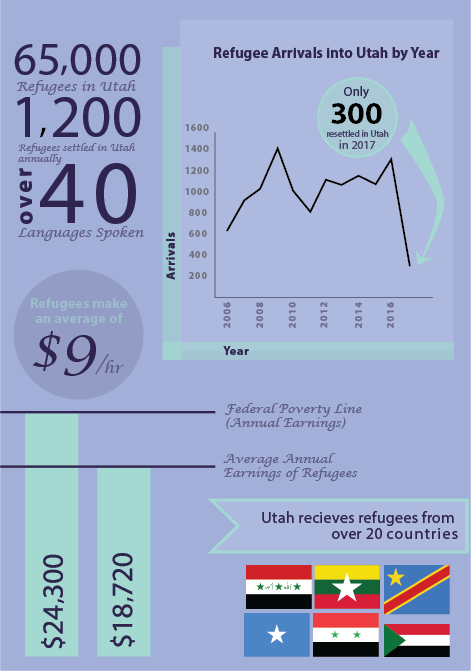
Mutolera Karama Kabaka remembers weeks spent lost and hungry in the wilderness of Congo.
His father, the mayor of their hometown, had been caught supplying both rebels and the military government with food, clothing and money in an attempt to keep either entity from harming his people. Kabaka’s parents were killed and his siblings were kidnapped. With only the clothes on his back, $20 in his pocket and dangerous rebels hunting him, Kabaka ran.
“After I ran away, I started suffering,” he said.
Kabaka is just one of many refugees who has since resettled in Utah. The state has always been home to refugees, noted Utah Gov. Gary Herbert in his recent letter to President Donald Trump.
“We empathize deeply with individuals and groups who have been forced from their homes and we love giving them a new home and a new life,” Herbert wrote in the letter.
The letter came in response to the Trump administration’s reduction in refugee acceptance rates. The Pew Research Center reported that the United States plans to admit only 18,000 refugees in fiscal year 2020, the lowest cap the country has had in decades. The U.S. admitted 30,000 refugees in 2019. Herbert called on Trump to send more refugees to Utah.
“I encourage you to allow us to accept more international refugees in Utah,” Herbert wrote. “We know the need has not decreased and are eager to see the number of admittances rise again.”
Resettlement
The refugee resettlement process is often long and complex. Every refugee’s journey is different, but many end up in refugee camps in places close to their home countries, such as Kabaka, who made his way to a refugee camp in Uganda. From these camps, refugees may be resettled in other countries, including the United States.
The United Nations assists refugees seeking resettlement. U.S. officers review each refugee’s case and perform a background check. If the refugee is cleared, he or she must also get a medical check and an orientation about the country and state before travelling to the U.S.
Getting on the list of refugees who will be resettled in the U.S. is mostly a matter of luck, according to Leonard Bagalwa, founder and executive director of Utah Valley Refugees. He first came to Utah as a refugee from Congo after being kidnapped and forced to join the military at age 17. Bagalwa ran away in 1997 and spent time in refugee camps in Malawi and Zimbabwe before coming to the U.S. in 2004.
Bagalwa said corruption in refugee camps has a significant influence over who will end up on the list to be resettled in the U.S. Refugees who have money or connections with camp leaders find their way onto the list, while others might wait in the camps for decades.
Kabaka stayed in the Ugandan refugee camp for 15 years. There, he met and married his wife and was reunited with his brother — but this camp, too, had its problems.
“In the refugee camp, everything is corruption,” Kabaka explained.
He was thrilled when he and his family were finally admitted to the U.S.
“In the plane, I tried to do this,” Kabaka said, miming pinching himself as if to check if he was dreaming. “It’s me, really! Yes! I didn’t believe.”
Life in Utah

The lucky few who get chosen and vetted to live in the U.S. don’t often choose where in the country they will live if they make it here. When a refugee arrives in Utah, he or she might find the local environment to be different from what they expected or have experienced.
“The culture is shocking here. Completely shocking,” Bagalwa said.
Culture and language barriers can be huge obstacles for refugees looking to rebuild stable lives. Emily Ostler, a BYU international relations student and former president of the BYU Refugee Empowerment Club, said many refugees arrive with degrees and skills but have trouble finding high-paying, enjoyable employment because they don’t speak English.
The language barrier and subsequent challenges it produces affect the local community’s perception of refugees.
“I think there’s a tendency for us to dumb down refugees and to not give them as much of a chance with regards to their intelligence and what they have to teach us,” Ostler said. She encouraged Utahns to abandon the notion that broken English indicates a lack of intelligence.
Bagalwa described how frustrating it was for him to have people make assumptions about his work ethic based on his refugee background.
“I’m not a lazy person. I work hard. I do two jobs. I have a family I feed and I never go on government (welfare programs). I have a home. I contribute. I’m not lazy,” he said.
Francis Badibanga first arrived in Utah three years ago from Congo. He agreed that the cultural and lingual barriers make life in the U.S. difficult but is grateful he and his family can live here in peace. He said he doesn’t want people here to think of him as a refugee because that isn’t how he defines himself.
“Everybody is from some place,” he said. “I think God wanted me to come here. Most people call me a refugee, but for me, I think not.”
Trump administration policies
Culture and language unfamiliarity aren’t the only factors that contribute to a negative perception of refugees. Carolina Núñez, associate dean of BYU’s Reuben J. Clark Law School and immigration law professor, said current administration rhetoric is also a barrier to accepting refugees in the community.
“There’s a lot of anti-refugee rhetoric to contend with,” Núñez said. “I think that any refugee community right now would be concerned about what we’re hearing from the Trump administration.”
On Jan. 27, 2017, Trump signed Executive Order 13769, titled “Protecting the Nation from Foreign Terrorist Entry into the United States.” The order suspended the issuing of visas to applicants from certain countries, including an indefinite suspension on Somalia. The order also briefly suspended all refugee resettlement in the United States.
“Proper controls are vital, as many refugees come from countries that are known sources of terrorism,” reads a recent White House fact sheet on the Trump administration’s refugee policies.
Aden Batar, immigration and refugee resettlement director for Catholic Community Services of Utah, came to Utah as a refugee from Somalia. He refuted the implication that terrorists might hide among refugees, noting that refugees are often the ones running away from terrorists.
“Things like that are not what the refugees are,” Batar said. “Refugees are people that have been victimized, people that have been persecuted, people that are escaping violence and trying to create a safe place so they can raise their families and their children. They’re not terrorists.”
He added that the U.S.’s intense vetting system would be impossible to breach, leaving Americans with no reason to fear terrorist attacks from refugees.
Trump also cited concerns about false asylum claims as one of his primary reasons for cracking down on border control.
“The biggest loophole drawing illegal aliens to our borders is the use of fraudulent or meritless asylum claims to gain entry into our great country,” Trump said, asserting that these people are taught by lawyers to find a Border Patrol agent and claim asylum without knowing what the phrase means.
Bagalwa said the negative political rhetoric surrounding refugees bleeds into his interactions with community members as they absorb and project racist ideologies. The discrimination against refugees in Utah County, he said, is systemic, engrained deeply into the culture and legal processes.
“When someone discriminates against me in my neighborhood, I don’t care because I know that it’s not his fault — it’s the system’s fault,” he said.
Kabaka reported that he, too, has experienced racial profiling since arriving in Utah, specifically from police officers.
Building community
According to Bagalwa, there are more good, accepting people here in Utah than discriminatory people. He said he’s grateful to be an American, to live in a place where he and his family can have peace.
He encouraged Utahns to get close to the refugee community — to be a friend to refugees, to volunteer with refugee organizations and to advocate for them in the community.
“When you hear their story, you will appreciate your own life and be willing to help them because you understand them,” he said.
Bagalwa, Kabaka, Batar and Badibanga are only a small sampling of the diverse refugee community that has found a home in Utah. Gov. Herbert expressed the hope that as the requested refugees arrive, Utahns will continue to reach out as they have in the past to make this state a home for refugees.
“Those refugees who resettle in Utah become integrated and accepted into our communities. They become productive employees and responsible citizens. They become contributors in our schools, churches and other civic institutions, even helping serve more recent refugees and thus generating a beautiful cycle of charity,” Herbert wrote. “This marvelous compassion is simply embedded into our state’s culture.”




